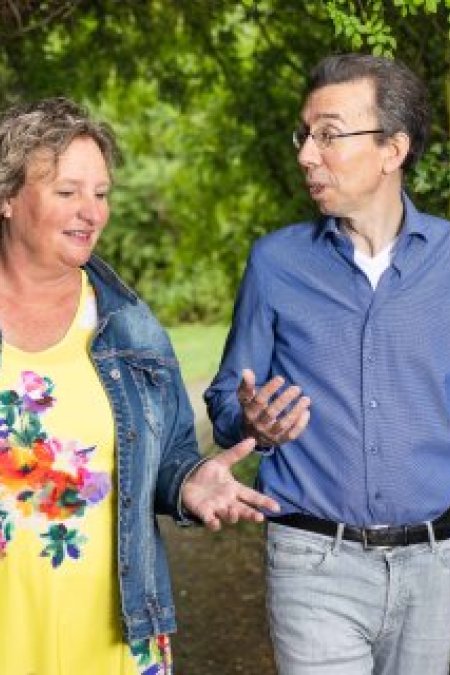UU Leadership Track: "it's about a culture of openness, diversity and appreciation"
Department head Annemiek van Gorp and professor François Kristen are both following the new UU leadership track for senior managers at Utrecht University. Their learning journey is almost over. How do they look at their role as leaders?

For almost five months, Van Gorp and Kristen, together with 15 fellow colleagues in managing roles, have been reflecting every month on what leadership at the university means to them. They are the eighth group of the new leadership course that the university offers to all its senior leaders. We meet on a sunny morning at Bar Beton in Rijnsweerd. In a moment, their harvest meeting will begin there. This is the final session in which the group reflects together on what they have learnt.
What are you most excited about so far?
"I like the fact that this programme does not say: this and this is a leader at Utrecht University, but that it is about establishing a culture of openness, diversity and appreciation. And then the question of how you shape this in a way that suits you," says van Gorp, who works as manager of the communication department of the Faculty of Humanities.
Kristen, professor of criminal law at the Faculty of Law, Economics, Governance and Organisation, likes the diverse group composition: "Our group includes the whole university: from department heads and professors to project leaders."
The UU leadership track
- For all senior managers in academic and support roles
- 6 to 8 days spread over 6 months
- Participants learn from each other, the programme mixes theory with practice
- Workshops on personal, organisational & strategic leadership
- The learning track is organised in collaboration with Kessels & Smit.

Why is this broad composition so valuable?
"First of all, it ensures that there are many different issues on the table, which in itself is instructive. But because of all the different backgrounds, everyone also looks at these issues with different perspectives. That is hugely enriching."
This wouldn't work that way with a group of direct colleagues, Kristen thinks. "Then you are all in the same boat and conversations quickly lead to recognition. Now it's nice that the other person can ask questions openly and unhindered by prior knowledge and really help you look for a solution to your problem."
We talk about what Kristen and Van Gorp have learned. Enthusiastically, they talk about the models, tools and interventions they have been given: how do you break patterns? How do different people deal with change and how do you adapt your leadership style accordingly?
What insights have you started applying immediately in your work?
Kristen: "Earlier, I might have been quicker to stop discussions during meetings. Whereas it's really good that someone gets the chance to tell their story. So that you can actually hear what evokes emotions in someone. So we learn not only to acknowledge and appreciate, but above all to recognise".
Getting tools to communicate what you see that is happening and knowing what your place in that process is.
"And this keeps coming back," adds Van Gorp. "You learn to analyse. You learn to better understand what is happening in the room. You learn to see it better and put words to it. Then you can also think better about your own place in it and appreciate others."
Ineke Verhagen (head of HR development) on why UU started the UU leadership track
"In academia, people often become leaders without having consciously chosen to do so or having continued their education. This calls for more attention to and support in developing leadership skills. That is why we are developing training courses at different leadership levels."
Recognition and Rewards
The additional focus on good leadership is in line with Recognition and Rewards, a programme in which all Dutch universities are working on a culture change away from the individualistic rat race, towards a culture in which the team and cooperation are central. Leadership in all layers of the organisation is an essential part of this.

Do you feel a more capable leader now? Calmer perhaps?
Van Gorp laughs. "Rather less calmer! We are still in the middle of it. I am now mostly very aware of all the things I am not so good at yet. But that will sort itself out."
What do you find challenging still?
Van Gorp: "Well, for instance, switching between content, process and procedure. Or about what kind of role you take on. Then I think, I could do this and that a bit more, but in order to do that I have to start practising."
Kristen adds: "It's also about activating the knowledge at the right time. That people have different styles in how they learn, for example is now well established in my head. But knowing which strategies I can apply as a manager in response to these styles, at the moment I have a conversation with someone, that still needs to grow." Van Gorp: "But that is exactly what we are practising now."
Then the trainer walks out of the conference room where the chairs are already arranged in a circle. It is time to start.

